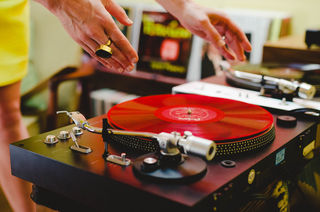Attention
Do You Hear What I Hear? How Music Creates Well-Being for Me
One of the wellness tools I use everyday to help manage my mood.
Posted October 2, 2019

Music plays a big part in my life. Sunday mornings, you’ll find Gord, my husband, and I listening to Ramsey Lewis Trio, maybe Amee Mann or better yet, the soundtrack to Garden State. We’ll eat our French toast with (real!) maple syrup, and I’ll be tapping my toes, savoring both the music and the company.
Gord has set up a great stereo system in our kitchen/living room so we can play our favorite vinyl while making dinner.
But music is important to me for a different reason as well. It’s one of the wellness tools I use every day to help manage my mood and symptoms.
When I’m dealing with mild symptoms (what I like to call mental illness "light"), music helps alleviate said symptoms to a point where I feel back to myself. It helps grounds me when I’m edgy. It comforts me when I’m mildly depressed. It calms me when I’m anxious.
When I’m in the midst of severe symptoms, it doesn’t reduce them so much as help distract me while I’m enduring them. It’s a pleasant, adaptive distraction, rather than an unhealthy, risky one (such as drinking too much, sleeping too long, or shopping online).
Distraction is an underrated coping strategy. It gives me a focus other than my rumination. It’s important for me to choose the "right" kind of music, however. Listening to sad, sloppy blues, or vitriolic death metal won’t lift my mood or shift my focus where I need it.
The music needs to be positive and uplifting. It needs to be something I enjoy—even if I can’t feel that enjoyment with the current state I’m in. Even if I did enjoy heavy metal or lonely emo, I suggest finding other genres to enjoy—at least for the time being.
Listening to music while I work doesn’t distract me, but ironically helps me focus. With mood changes, particularly the upswings, music keeps the beat and rhythm that I can’t stay in tune with.
My fave kind of music is old and new jazz crooners, both male and female. Think Mel Torme, Frank Sinatra, Julie London, Peggy Lee, Norah Jones, and Diana Krall. I like the simplicity of the sweet ’70s, like Hall and Oats, Las Vegas Turn-a-Round, Cat Stevens, Roberta Flack. It’s corny, I know, but I think it’s that naivety that gives me hope when I’m down. Coffee House music is another one. I also love yoga and meditation music, particularly if lyrics of any sort trigger me.
I subscribe to Spotify (a digital music service). It’s the best $10 per month I spend. I’ve discovered multitudes of songs and artists I love. If you like a song, you can click to find the "radio" associated with it that has similar music. Besides the typical genre search, you can use a search word like "comforting" or "happy" or "gentle" and get a plethora of excellent choices.
I’ve downloaded playlists on my phone so I can play them when I travel. Pop in earbuds and voila—your very own portable wellness tool. Comfort on the go. Music you can listen to almost anywhere. Yoga—not so much—you can’t do that just anywhere. And frankly I don’t want to.
Here are links to four of my fave playlists:
What’s the go-to song that gets you back to your center? Care to share? I’d love to know.
© Victoria Maxwell


